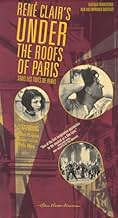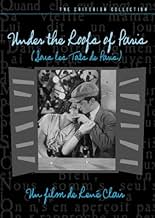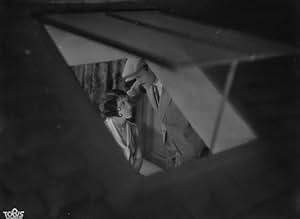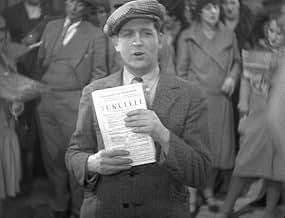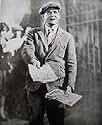Sous les toits de Paris
- 1930
- Tous publics
- 1h 36m
IMDb RATING
7.0/10
2.6K
YOUR RATING
Albert is smitten for Pola but ends up wrongly committed in jail, in the meantime her affections are sought after by his friend, and on his release both love and friendship must be tested.Albert is smitten for Pola but ends up wrongly committed in jail, in the meantime her affections are sought after by his friend, and on his release both love and friendship must be tested.Albert is smitten for Pola but ends up wrongly committed in jail, in the meantime her affections are sought after by his friend, and on his release both love and friendship must be tested.
- Awards
- 1 win total
Edmond T. Gréville
- Louis
- (as Edmond Gréville)
Delphine Abdala
- La buraliste
- (uncredited)
Raymond Aimos
- Un gars du milieu
- (uncredited)
Raymond Blot
- Un membre de la bande à Fred
- (uncredited)
Thomy Bourdelle
- François
- (uncredited)
Léon Courtois
- L'inspecteur
- (uncredited)
Édouard Francomme
- Un membre de la bande à Fred
- (uncredited)
André Michaud
- Un agent
- (uncredited)
Jane Pierson
- La dame du premier
- (uncredited)
Louis Pré Fils
- Le locataire du troisième
- (uncredited)
Eugène Stuber
- Un membre de la bande à Fred
- (uncredited)
Louis Zellas
- Le consommateur jaloux
- (uncredited)
- Director
- Writer
- All cast & crew
- Production, box office & more at IMDbPro
Featured reviews
While singing in a lower class quarter in Paris, the street singer Albert (Albert Préjean) falls in love with the Romanian party girl Pola (Pola Illéry), who is the companion of the gangster Fred (Gaston Modot). One night, Albert meets with Pola, who has just found that Fred had stolen her key, and his friend Louis (Edmond T. Gréville) proposes to toss to date her. However, Albert brings her to his room and they spend the night together, with Albert sleeping on the floor and Pola on his bed. Early in the morning, the pickpocket Émile (Bill Bocket) brings a bag with stolen pieces and asks Albert to keep the bag for him. When the police busts Albert's room and finds the stolen goods, he is arrested and sent to jail. Meanwhile Fred travels and Pola seeks comfort with Louis, and they stay together. When Émile is arrested by the police, he confesses that Albert is innocent and he is released and seeks out Pola. Meanwhile Fred returns to Paris and also seeks out Pola that is with Louis. The three men that are under the spell of the gorgeous lady dispute her love and only one wins.
"Sous les Toits de Paris" is a film with a wonderful transition between silent and sound eras. This is the first René Clair's film that I watched and I found very original and interesting the style of this director that uses the acting of silent movies with gestures and facial expressions and dialogs instead of intertitles, everything supported by the marvelous song "Sous les Toits de Paris" and impressive camera work. The paradox of this delightful film are the low-life characters, composed by pickpocket (Émile); gangster (Fred); a pickpocket that steals the girl of his friend (Louis); and an easy woman (Pola). It is also unusual that the girl does not end the story with the good guy, showing no commercial concern like in most of the Hollywood movies. Not only Albert, Fred and Louis, but I have also been bewitched by the beauty and charm of Pola Illéry. I did not find any information about the death of this actress in Internet. My vote is eight.
Title (Brazil): "Sob os Tetos de Paris" ("Under the Ceilings of Paris")
"Sous les Toits de Paris" is a film with a wonderful transition between silent and sound eras. This is the first René Clair's film that I watched and I found very original and interesting the style of this director that uses the acting of silent movies with gestures and facial expressions and dialogs instead of intertitles, everything supported by the marvelous song "Sous les Toits de Paris" and impressive camera work. The paradox of this delightful film are the low-life characters, composed by pickpocket (Émile); gangster (Fred); a pickpocket that steals the girl of his friend (Louis); and an easy woman (Pola). It is also unusual that the girl does not end the story with the good guy, showing no commercial concern like in most of the Hollywood movies. Not only Albert, Fred and Louis, but I have also been bewitched by the beauty and charm of Pola Illéry. I did not find any information about the death of this actress in Internet. My vote is eight.
Title (Brazil): "Sob os Tetos de Paris" ("Under the Ceilings of Paris")
René Clair's "Sous les toits de Paris" ("Under the Roofs of Paris" in English) manages to strike the right balance between happy and gritty. This jolly musical tells the story of a love affair between street singer Albert and Romanian immigrant Pola. Or at least, they attempt a romance. They're surrounded by all manner of lowlifes. This is not the gay Paree that we expect.
Released when talkies were still in their relative infancy, the movie has sound scenes, but also silent ones. It finds the right balance between them. Moreover, the characters are complex if lowly individuals. Watching it all these years later, I wonder which direction French cinema would've taken had World War II not happened.
Anyway, outstanding movie. Not the greatest by any stretch, but still impressive.
Released when talkies were still in their relative infancy, the movie has sound scenes, but also silent ones. It finds the right balance between them. Moreover, the characters are complex if lowly individuals. Watching it all these years later, I wonder which direction French cinema would've taken had World War II not happened.
Anyway, outstanding movie. Not the greatest by any stretch, but still impressive.
I'd be lying if I said this didn't surprise me a little bit. In various ways it is, in turn, clever, novel, well done and brilliant, but also sometimes a tad uneven. René Clair's orchestration of shots and scenes as director is outstanding and often kind of ingenious, and the cinematography of Georges Périnal and Georges Raulet could hardly be more vivid and lovely; these are the first facets to catch our attention, in fact. There's also no mistaking how wonderfully crisp the image is on a basic level, and clearly this benefited from preservation efforts that some of its contemporaries didn't enjoy. It also stands out as one of the earliest sound pictures to come out of France, and more than that, Clair dallies with sound in a very playful, atypical manner - declining innate audio at many points underneath the original music, at others possibly spotlighting some sounds and not others that would coincide with action on-screen, and then still using some louder sounds to "cloak" softer ones and thus avoid the need to capture and reproduce every last one. All the while, it's certainly worth noting that 'Sous les toits de Paris' ('Under the roofs of Paris') is marvelously well made in all other regards, with sets, costume design, hair, and makeup that are utterly terrific. The sound design is perhaps imbalanced as it presents, but under the circumstances I think we can forgive the slight deficiency.
The writing is another matter in some measure. By all means, the story is compelling, and ultimately enjoyable and strongly satisfying as a viewer. Broadly speaking the scene writing, dialogue, and characters range from suitable to flesh out the tableau, to excellent. I think this suffers a bit in the details, however. As it happens, like another early French talkie released in 1930, Augusto Genina's 'Prix de beauté,' I think this title has a problem with finding the appropriate tone. 'Sous les toits de Paris' dallies with crime, romance, music, comedy, violence, and drama, and ranges from funny, to heartwarming, to inspiring, while also being unexpectedly dark and dour at new few points, including the ending. It generally seems like the feature builds strength and gels more cohesively as the runtime elapses, but the mood imparted wavers and never quite entirely feels just right. This difficulty is amplified by the peculiar directness of the storytelling, for in some cases it rather comes across that a beat or idea hasn't been meaningfully developed, and is instead just flatly introduced. When the notion of marriage is brought up, for example, it definitely doesn't seem to have received any significant treatment in the narrative, or discussion by the characters; one happily pronounces "I'm getting married," and it is just so - and the cold contrivance of such instances is exemplified in this one when their partner responds to this proclamation with a quizzical expression on their face. Suspension of disbelief takes a hit at such times.
These troubles in writing and/or execution are unfortunate, because the screenplay is mostly quite smart and solid. Clair penned a worthy, engaging tale, and everyone involved put in fine work to bring the movie to vibrant life, particularly concerning that unusual use of sound (in 1930, no less). Such quality certainly includes the cast, all giving swell performances, with Albert Préjean, Pola Illéry, and Edmond T. Gréville naturally standing out giving their prominence, but also in my opinion proving that they deserve it with the skill they demonstrate. While it's regrettable that the whole takes a while to especially come together, had the writing been tightened just a tad the end result would have benefited considerably. With all this said, though, it speaks very well to the capabilities and intelligence of all who participated in the feature's creation that it comes off as well as it does, with value that handily outweighs the weaker facets. Whatever one's impetus for watching and however one comes across 'Sous les toits de Paris' I don't think it's so essential as to fully demand viewership, but it's unquestionably deserving of recognition on its own merits. Don't necessarily feel the need to go out of your way for it, but if you have the chance to watch, this is worth exploring.
The writing is another matter in some measure. By all means, the story is compelling, and ultimately enjoyable and strongly satisfying as a viewer. Broadly speaking the scene writing, dialogue, and characters range from suitable to flesh out the tableau, to excellent. I think this suffers a bit in the details, however. As it happens, like another early French talkie released in 1930, Augusto Genina's 'Prix de beauté,' I think this title has a problem with finding the appropriate tone. 'Sous les toits de Paris' dallies with crime, romance, music, comedy, violence, and drama, and ranges from funny, to heartwarming, to inspiring, while also being unexpectedly dark and dour at new few points, including the ending. It generally seems like the feature builds strength and gels more cohesively as the runtime elapses, but the mood imparted wavers and never quite entirely feels just right. This difficulty is amplified by the peculiar directness of the storytelling, for in some cases it rather comes across that a beat or idea hasn't been meaningfully developed, and is instead just flatly introduced. When the notion of marriage is brought up, for example, it definitely doesn't seem to have received any significant treatment in the narrative, or discussion by the characters; one happily pronounces "I'm getting married," and it is just so - and the cold contrivance of such instances is exemplified in this one when their partner responds to this proclamation with a quizzical expression on their face. Suspension of disbelief takes a hit at such times.
These troubles in writing and/or execution are unfortunate, because the screenplay is mostly quite smart and solid. Clair penned a worthy, engaging tale, and everyone involved put in fine work to bring the movie to vibrant life, particularly concerning that unusual use of sound (in 1930, no less). Such quality certainly includes the cast, all giving swell performances, with Albert Préjean, Pola Illéry, and Edmond T. Gréville naturally standing out giving their prominence, but also in my opinion proving that they deserve it with the skill they demonstrate. While it's regrettable that the whole takes a while to especially come together, had the writing been tightened just a tad the end result would have benefited considerably. With all this said, though, it speaks very well to the capabilities and intelligence of all who participated in the feature's creation that it comes off as well as it does, with value that handily outweighs the weaker facets. Whatever one's impetus for watching and however one comes across 'Sous les toits de Paris' I don't think it's so essential as to fully demand viewership, but it's unquestionably deserving of recognition on its own merits. Don't necessarily feel the need to go out of your way for it, but if you have the chance to watch, this is worth exploring.
"Sous les toits de Paris", a 1930 comedy/drama was René Clairs first venture into sound film making - and is already a masterful showcase for the use of sound. It is actually a blend between silent movie and talking movie with whole sections being without any sound or the dialogue turned off. In its deliberate use of sound, the movie reminded me of Fritz Lang's "M".
Also, the sets are fantastic. They show the "lower" quarters of Paris as both a fantastic place and a realist place. It gives the movie a very nice touch.
But the story isn't that fantastic. It's a simplistic plot about a man falling in love. He's getting arrested. In the meantime, his best friend falls in love with his girl. I think Clair wasn't out to write something terribly new but used this simple, yet lovely story to carry his technical idea about sound (he was at that time still a strong defender of the silent cinema). Also, he wanted to show the "other" life in Paris, the low life. And he succeeds quite well at that.
All that said, however, I have to add that this isn't my kind of film. I appreciate its virtuoso style for its time, I even might consider it a classic to some extend because it led the way for a generation of film makers - but personally, it doesn't do much for me. I watch it sort of emotionless. Overall, I'd give it a very personal
6/10
Also, the sets are fantastic. They show the "lower" quarters of Paris as both a fantastic place and a realist place. It gives the movie a very nice touch.
But the story isn't that fantastic. It's a simplistic plot about a man falling in love. He's getting arrested. In the meantime, his best friend falls in love with his girl. I think Clair wasn't out to write something terribly new but used this simple, yet lovely story to carry his technical idea about sound (he was at that time still a strong defender of the silent cinema). Also, he wanted to show the "other" life in Paris, the low life. And he succeeds quite well at that.
All that said, however, I have to add that this isn't my kind of film. I appreciate its virtuoso style for its time, I even might consider it a classic to some extend because it led the way for a generation of film makers - but personally, it doesn't do much for me. I watch it sort of emotionless. Overall, I'd give it a very personal
6/10
Having been highly impressed by "Le Million", I decided to check out Rene Clair's other acclaimed musical comedy, "Under the Roofs of Paris". I can happily assure you that this film was even better than "Le Million" in almost every single way. It amps up the heart and humor, has a much stronger emotional impact, and, while "Le Million" felt like a purely plot driven film, "Under the Roofs of Paris" balances plot and character to near perfection.
This hilarious love story unfolds slowly and steadily, introducing the audience to different characters and places without rushing everything. We watch and learn before the plot strikes us like a lightning bolt of beauty. Rene Clair's camera beautifully glides through the streets of Paris, following characters and peaking in on their most fragile moments. This film is like the finest work of literature; it contains laughs and tears, moments of melancholy and hope. It is, simply, a masterpiece.
This hilarious love story unfolds slowly and steadily, introducing the audience to different characters and places without rushing everything. We watch and learn before the plot strikes us like a lightning bolt of beauty. Rene Clair's camera beautifully glides through the streets of Paris, following characters and peaking in on their most fragile moments. This film is like the finest work of literature; it contains laughs and tears, moments of melancholy and hope. It is, simply, a masterpiece.
Did you know
- TriviaThe opening sequence and the street scenes were filmed in a studio.
- Quotes
Albert, a young street singer: [On seeing Pola bedding down on his bedroom floor] Okay, take the bed, I'll sleep on the floor.
- ConnectionsFeatured in Les dossiers de l'écran: Boulevard du crépuscule (1969)
- How long is Under the Roofs of Paris?Powered by Alexa
Details
- Runtime1 hour 36 minutes
- Color
Contribute to this page
Suggest an edit or add missing content

Top Gap
By what name was Sous les toits de Paris (1930) officially released in India in English?
Answer


